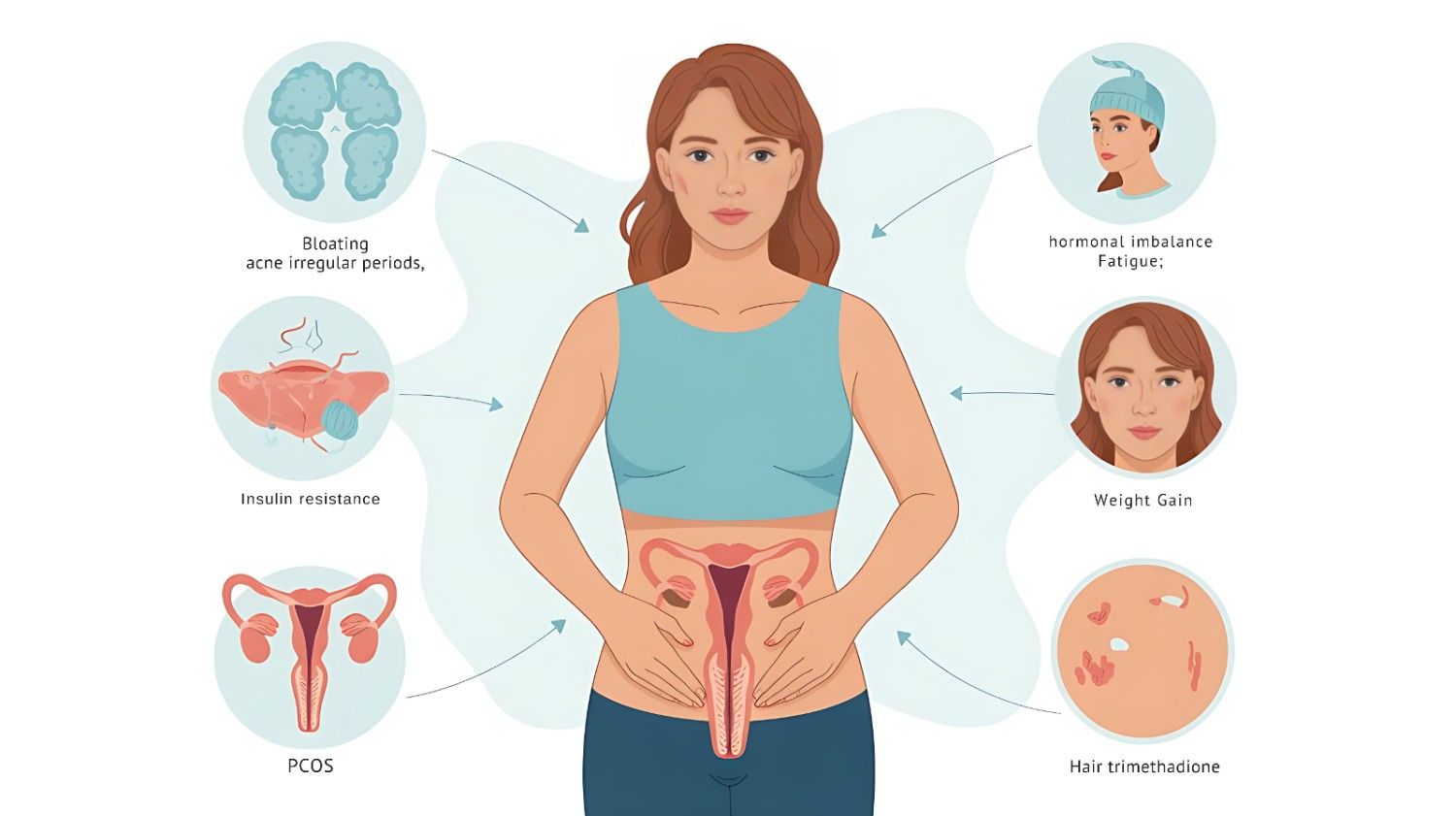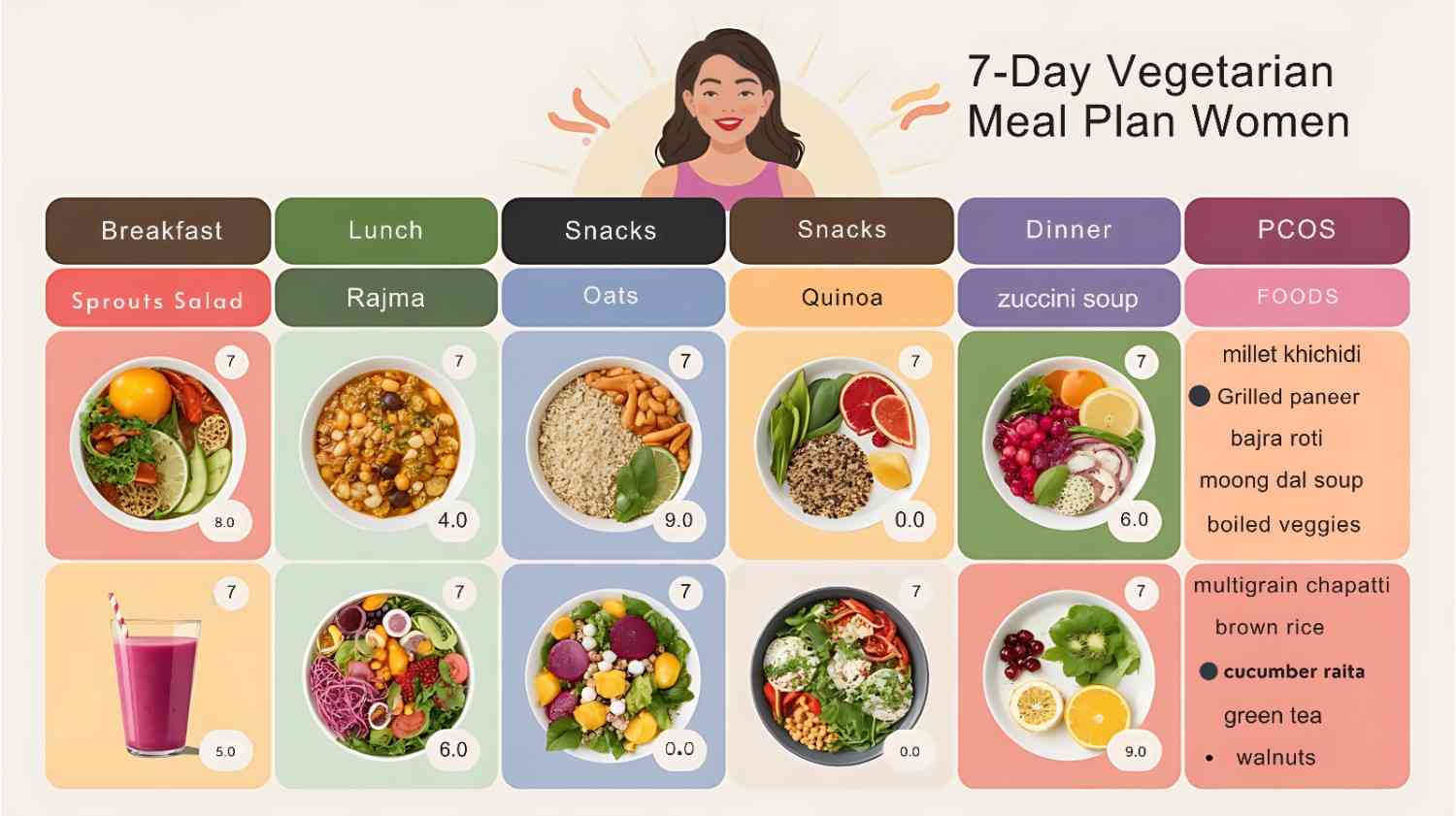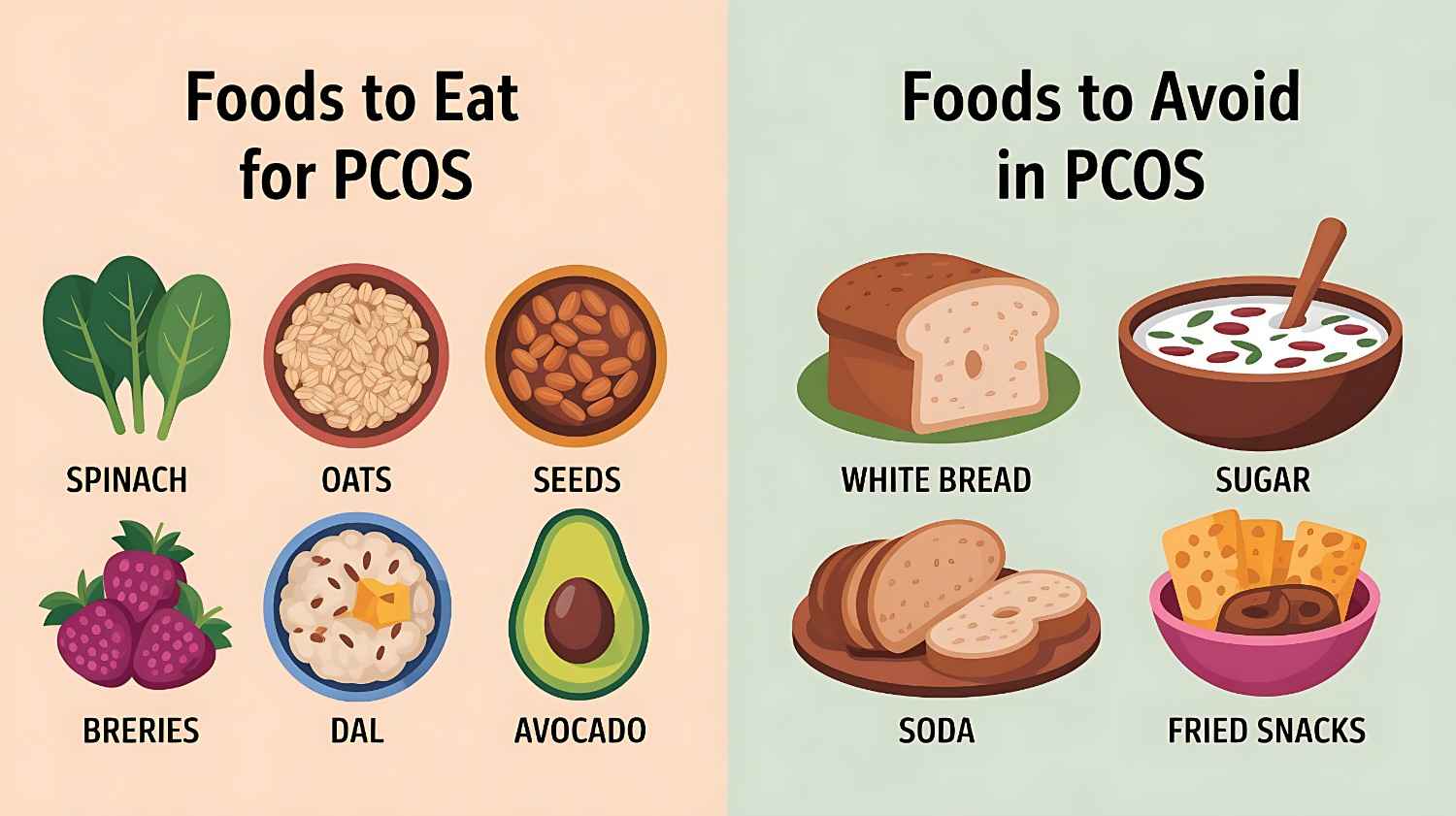PCOS Diet Chart for Weight Loss

Tired of fighting your body with every meal? Struggling with unpredictable cycles, sudden weight gain, or stubborn belly fat that just won’t go away? If yes, you might be dealing with PCOS. And the game-changer? A well-structured PCOS diet chart for weight loss.
Did you know that Polycystic Ovary Syndrome (PCOS) affects nearly 1 in 10 women of childbearing age? That’s millions of women worldwide dealing with the challenges of managing PCOS condition every day.
PCOS and PCOD are hormonal disorders where the ovaries produce higher-than-normal amounts of male hormones. This imbalance can lead to many issues in the body. So, it is important to manage PCOS and PCOD. The good news is that it is possible to manage it by making small but significant lifestyle adjustments.
This blog isn’t just theory—it’s a practical guide built from real experiences and proven strategies to help you rebalance your hormones, lose fat, and feel confident again.
What Is PCOS and Why Does It Mess With Everything?
PCOS Diet Chart for Weight Loss
Polycystic Ovary Syndrome (PCOS) is a hormonal imbalance where your ovaries produce excess androgens (male hormones). This can interfere with ovulation, cause irregular periods, acne, and lead to unwanted weight gain.
Many women with PCOS also struggle with insulin resistance, meaning your body can’t use insulin properly. That leads to sugar cravings, energy crashes, and fat storage—especially around your belly. That’s exactly why a clean, balanced PCOS diet chart for weight loss is a powerful first step toward healing.
Why Diet is the Foundation of PCOS Management
Your food choices affect everything—your hormones, energy, cravings, mood, and weight. When you choose the right foods, you help your body reduce inflammation, stabilize blood sugar, and regulate your menstrual cycle.
The goal isn’t to eat less—it’s to eat smarter. A balanced PCOS diet chart for weight loss helps correct insulin resistance, reduces bloating, and restores your natural rhythm.
- Hormonal Imbalance: Androgens are male hormones that are naturally present in small amounts in women. However, in women with PCOS or PCOD, the ovaries produce an excess of androgens, which disrupts the normal functioning of the ovaries and ovulation.
- Insulin Resistance: The hormone insulin facilitates the body’s utilization of glucose, or sugar, as fuel. Insulin resistance is a condition that many women with PCOS or PCOD have, which prevents their bodies from using insulin as intended. This can lead to high blood sugar levels and, frequently, weight gain.
- Inflammation: Low-grade inflammation in the body can stimulate the ovaries to produce more androgens.
- Genetics: PCOS often runs in families, suggesting a genetic link.
PCOS Diet Chart for Weight Loss
7-Day Vegetarian PCOS Diet Chart for Weight Loss

| Day | Breakfast | Lunch | Evening Snack | Dinner |
|---|---|---|---|---|
| Day 1 | Moong dal chilla + mint chutney + herbal tea | Quinoa pulao + cucumber raita | Roasted chickpeas + green tea | Lauki curry + 1 phulka + salad |
| Day 2 | Oats porridge with chia seeds and berries | Brown rice + rajma + salad | Apple slices with peanut butter | Stir-fried tofu + multigrain roti |
| Day 3 | Vegetable upma + flaxseeds | Millet khichdi + curd | Buttermilk + almonds | Mixed lentil soup + sautéed spinach |
| Day 4 | Sprouts salad + lemon + green tea | Grilled paneer + sautéed veggies | Coconut water + makhana | Soya bhurji + 1 chapati |
| Day 5 | Avocado toast on whole grain bread | Bajra roti + methi sabzi | Green tea + walnuts | Mixed veg curry + brown rice |
| Day 6 | Green smoothie (spinach, cucumber, apple) | Moong dal soup + boiled veggies | Hummus + cucumber sticks | Palak paneer + beetroot salad + roti |
| Day 7 | Dalia + seeds + nuts | Multigrain chapati + light sabzi + salad | Herbal tea + pumpkin seeds | Zucchini stir-fry + dal + brown rice |
Every meal in this PCOS diet chart for weight loss is designed to nourish your body, support metabolism, and help manage cravings while promoting fat loss and hormonal balance.
cing elit. Ut elit tellus, luctus nec ullamcorper mattis, pulvinar dapibus leo.
Smart Eating for PCOS: What to Include and Avoid

What to Eat:
Whole grains, green leafy veggies, lentils, lean protein (like tofu and paneer), nuts, seeds, and healthy fats like olive oil or avocado are all hormone-friendly. They help reduce insulin resistance and keep your energy stable.
Healthy Eating Habits
The diet plays a major role in managing PCOS symptoms. A diet with a low glycemic index (GI) can help control blood sugar and insulin resistance.
- The best fruits for PCOS are fruits with a low GI, such as berries, cherries, apples, and pears, which can be beneficial. These fruits provide essential nutrients and antioxidants without causing rapid spikes in blood sugar levels.
- At the same time, it’s advisable to limit or avoid high-GI fruits like watermelon and pineapple, which can increase insulin resistance.
- A balanced diet rich in whole grains, lean proteins, healthy fats, and plenty of vegetables is best for managing PCOS. Fill up your plate with foods high in fiber, such as legumes, nuts, seeds, and vegetables. They can help improve your insulin sensitivity and promote satiety, which may aid in weight management—a common concern for individuals with PCOS.
What to Avoid:
Processed foods, sugar-laden snacks, refined carbs (white bread, Maida), fried items, and too much dairy can worsen bloating, inflammation, and insulin resistance.
PCOS Diet Chart for Weight Loss
Foods to Limit in PCOS and Why
1. Refined Carbs & Sugar:
These raise blood sugar rapidly and cause fat storage, especially around the waist. Avoid sweets, white bread, and sugary beverages—they make PCOS symptoms worse.
2. Excess Dairy:
Some women with PCOS are sensitive to dairy, which can trigger hormonal acne or bloating. Try switching to plant-based alternatives and track how your body responds.
3. Caffeine Overload:
Too much coffee or energy drinks can elevate cortisol levels, which affects insulin and hormone balance. Stick to herbal teas or limit caffeine to 1 cup a day.
4. Fried & Packaged Foods:
Loaded with trans fats and sodium, these increase inflammation and mess with your hormones. They also slow down your fat loss efforts, even if you’re following a strict PCOS diet chart for weight loss.
Lifestyle Changes to Support PCOS Weight Loss

1. Move Your Body Daily:
Exercise helps regulate blood sugar and reduces belly fat. Mix strength training, walking, and yoga 4–5 days a week for best results.
2. Prioritize Good Sleep:
Hormones like ghrelin and leptin (which regulate hunger) are disrupted without proper sleep. Aim for 7–8 hours of deep, uninterrupted sleep.
3. Manage Stress Proactively:
Chronic stress increases cortisol, which makes PCOS symptoms worse. Try journaling, meditation, nature walks, or even 10 minutes of deep breathing daily.
4. Stay Hydrated:
Water supports digestion and hormonal detox. Add lemon or cucumber slices for a refreshing, natural cleanse.
5. Think Long-Term, Not Perfect:
A PCOS-friendly lifestyle is about progress, not perfection. Show up for your body consistently with love—not restriction.
PCOS Diet Chart for Weight Loss
Common Mistakes That Slow Down Your PCOS Progress
1. Skipping Meals:
Going too long without food can crash your blood sugar, making you hangry and tired. Eating regularly prevents overeating and supports metabolism.
2. Going Too Low-Calorie:
Extreme calorie restriction backfires. It slows metabolism and puts stress on your thyroid and hormones. Instead, eat nourishing meals with the right balance.
3. Relying Only on Cardio:
Cardio is great, but strength training is crucial. It helps improve insulin sensitivity and builds muscle, which burns more fat even at rest.
4. Ignoring Gut Health:
A healthy gut supports hormone regulation. Add fermented foods like curd, pickles, or kefir to improve digestion and reduce inflammation.
5. Not Prioritizing Sleep & Recovery:
If you’re always tired and stressed, your body won’t burn fat efficiently. Rest and recovery are part of your PCOS weight loss plan too.
Conclusion: Your Body Is Not the Enemy—It’s Your Ally
PCOS Diet Chart for Weight Loss
PCOS is your body’s way of asking for better care. With the right food, habits, and mindset, you can reverse its symptoms and feel like yourself again. A consistent, flexible, and realistic PCOS diet chart for weight loss helps you take back control—without starving, stressing, or giving up your favorite foods forever.
Remember, you’re not failing. You’re learning what your body actually needs. One small change at a time can transform everything.
🔗 Related Read
If you found this guide helpful, you’ll definitely want to check out our in-depth blog on Indian Diet Chart for Weight Loss for Females — it’s packed with practical food combinations and fat-burning insights tailored for Indian women!
PCOS Diet Chart for Weight Loss
🥗 Get Your Personalized Diet Plan
Struggling to figure out what’s right for your body? Let us simplify it for you. At Fit with Mohit, we offer a personalized PCOS diet plan that’s 100% custom-built for your needs, lifestyle, and preferences. Whether your goal is weight loss, hormonal balance, or improved energy—we’ve got your back.
📲 Let’s Stay Connected!
Don’t miss out on expert tips, real client results, and daily motivation. Follow us for powerful content that actually works:
📸 Instagram: @fitwithmohit
📺 YouTube: Fit with Mohit
